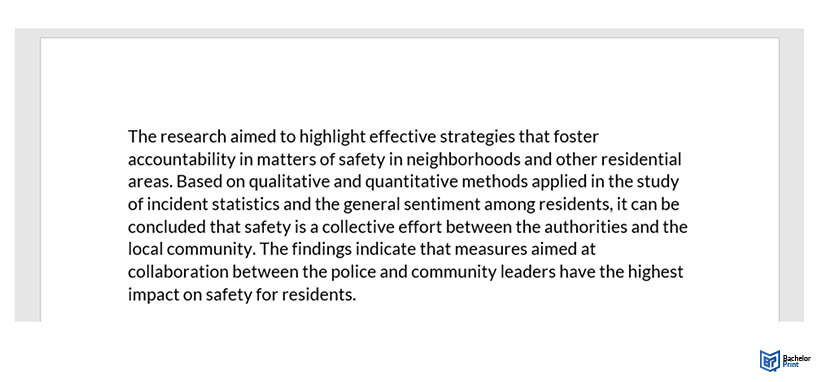
The dissertation conclusion marks a substantial significance as it supplies the final remarks on the entire research process. It provides the option to depict the implications of the findings, answer the research questions, relate the outcomes to the broader field of study, and suggest areas for further research. Composing an effective conclusion for your dissertation requires precision to encapsulate the essence of your research. This article looks closely into crafting a dissertation conclusion.
Definition: Dissertation conclusion
The dissertation conclusion refers to the last part of a thesis or dissertation. It clearly outlines the answer to the research question proposed. It further makes recommendations for subsequent research on the topic and highlights the new knowledge contributed to the field. The dissertation conclusion should be precise and compelling as it solidifies the arguments and ideas demonstrated and supporting evidence that leads to the definitive conclusion.
Dissertation conclusion vs. discussion
The conclusion and discussion are similar in most instances, with some shorter research papers combining them in one section. In a thesis or dissertation, the discussion highlights your findings’ meaning, relevance, and importance. It primarily focuses on explaining and analyzing your conclusions, establishing the relationship between the results and your sources, and proposing supportive statements for your general conclusion.
The dissertation conclusion is typically shorter than the discussion. It entails broader statements on the topic that summarize the most vital discoveries in the research. As such, the dissertation conclusion should not propose new ideas or arguments.
Dissertation conclusion: Word count
A dissertation conclusion should ideally be 5 -7% of the total word count, depending on the type of thesis. A quantitative research study usually has a shorter dissertation conclusion that refers to the main conclusions and findings. Qualitative research in humanities and social sciences may present a longer dissertation conclusion as the bulk of the research text is text-based.
Dissertation conclusion: Research question
When writing a dissertation conclusion, begin with the main research question the thesis focuses on answering. Use the dissertation conclusion to propose a closing argument on the research you have carried out and offer a clear answer on your thoughts on the topic.
Avoid restating the results in the body of the text; instead, merge them into a final thought process that the reader can understand and use as the main takeaway.

For a theoretical argument, the dissertation conclusion can begin as follows:
Dissertation conclusion: Summary and reflection
The dissertation conclusion offers an author the opportunity to reinforce the message and remind the reader of the methods applied, the initial expectations, and how the findings compare to the expectations. It should summarize the steps taken to conduct the research and present your argument.
You can take a reflective approach rather than giving a summary of individual chapters. For example, you can determine the effectiveness of your research methods in answering the research question and if you encountered any unforeseen discoveries during the study.
Additionally, you can highlight any further constraints not stated in the main body. This should be discussed in brief, as the main purpose of the summary is to dwell on the positive outcomes of your work.
Dissertation Conclusion: Recommendations
The conclusion is a good avenue to expound and move forward, even though you might have included recommendations for further studies in the discussion.
You should avoid overstating the pertinence of your findings. This is particularly important in research that aims to guide processes such as business, where there are far-reaching implications of implementing new policies. Ensure you frame your recommendations as suggestions rather than authoritative remarks.
Dissertation conclusion: Contributions
As you sum up your thesis, establish that your readers are left with a lasting impression of your contribution to the body of knowledge in your field.
You can achieve this by:
- Reiterating the problem statement to illustrate how your work solves the problem.
- Returning to the literature review and explaining how you have filled a knowledge gap.
- Illustrate how your conclusions support or differ from widely held beliefs and assumptions.
Dissertation conclusion: Wrap it up
You can wrap up the last steps to complete your dissertation as soon as you have completed your discussion. You can proceed to write the abstract followed by a complete reference list depending on the writing style used in the research text. The appendices follow, then you can create the title page and the table of contents. Ensure you proofread the document for errors and establish a logical flow throughout the research.
FAQs
The dissertation conclusion should be about 5-7% of the research body. It should give a snapshot of the research question posed and the methodology used to arrive at the conclusions.
A discussion shows the details of the research question and the supportive evidence. The conclusion is a brief statement that merges the problem statement and the results.
It refers to the techniques used and unexpected questions arising during research. The reflective approach is important to offer alternative insights that may guide future research.
Ensure you don’t introduce any new information in the discussion. Also avoid exaggerating or undermining your work.
